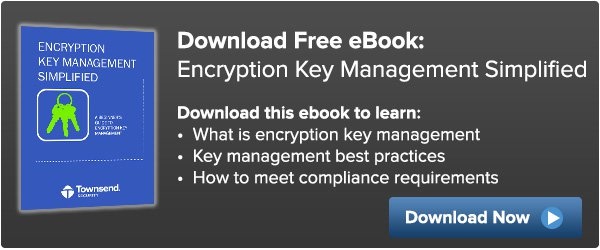Securing data with encryption and protecting the encryption keys with proper key management is addressed in many compliance regulations and security best practices.
Let’s take a look at the Security Rule and Omnibus Rule (update to HIPAA/HITECH compliance regulations) that cover Protected Health Information (PHI)  and the data security requirements that affect Drupal developers or users. When dealing with the healthcare industry, Personally Identifiable Information (PII) is a subset of PHI, and refers to information that is uniquely identifying to a specific individual. Protected Health Information is specific to medical and health-related use and generally refers to demographic information, medical history, test and laboratory results, insurance information and other data that is collected by a healthcare professional to identify an individual and determine appropriate care. To better understand the recent changes in HIPAA/HITECH regulations, here are a few key rules that provide guidance:
and the data security requirements that affect Drupal developers or users. When dealing with the healthcare industry, Personally Identifiable Information (PII) is a subset of PHI, and refers to information that is uniquely identifying to a specific individual. Protected Health Information is specific to medical and health-related use and generally refers to demographic information, medical history, test and laboratory results, insurance information and other data that is collected by a healthcare professional to identify an individual and determine appropriate care. To better understand the recent changes in HIPAA/HITECH regulations, here are a few key rules that provide guidance:
The Security Rule
The Department of Health and Human Services (HHS) and the Centers for Medicare & Medicaid Services (CMS) provide guidance around the protection of sensitive data and PHI based on a security series of seven papers, each focused on a specific topic related to the Security Rule. The rule is officially titled “Security Standards for the Protection of Electronic Protected Health Information” (45 CFR Part 160 and Part 164, Subparts A and C) but is commonly known as the Security Rule.In the Security Rule standards on Technical Safeguards [164.304 as “the technology and the policy and procedures for its use that protect electronic protected health information and control access to it.”], encryption and decryption requirements regarding the transmission of health-related information are covered in sections 164.312(a)(2)(iv) and 164.312(e)(2)(ii).
HHS offers the following guidance to render Protected Health Information as unusable, unreadable, or indecipherable to unauthorized individuals:
Electronic PHI has been encrypted as specified in the Security Rule by “the use of an algorithmic process to transform data into a form in which there is a low probability of assigning meaning without use of a confidential process or key” (45 CFR 164.304 definition of encryption) and such confidential process or key that might enable decryption has not been breached. To avoid a breach of the confidential process or key, these decryption tools should be stored on a device or at a location separate from the data they are used to encrypt or decrypt.
The Omnibus Final Rule
On January 25, 2013, the Office for Civil Rights (OCR) of the U.S. Department of Health and Human Services published the Omnibus Final Rule, entitled “Modifications to the HIPAA Privacy, Security, Enforcement, and Breach Notification Rules under the Health Information Technology for Economic and Clinical Health (HITECH) Act and the Genetic Information Nondiscrimination Act (GINA); Other Modifications to the HIPAA Rules” (Omnibus Rule), 78 Fed. Reg. 5566. The Omnibus Rule was effective on March 26, 2013, with a compliance period of 180 days, requiring compliance as of September 23, 2013.
The Omnibus Rule Summary:
- Finalizes modifications to the Privacy, Security, and Enforcement Rules to implement the Health Information Technology for Economic and Clinical Health (HITECH) Act, proposed in July 2010
- Finalizes modifications to the Privacy Rule, proposed in July 2010, to increase the workability of the Privacy Rule
- Modifies the Breach Notification Rule, adopted by interim final rule in August 2009
- Finalizes modifications to the Privacy Rule to implement the Genetic Information Nondiscrimination Act of 2008 (GINA), proposed in October 2009
Within the Omnibus Rule, HHS makes it clear that certain provisions of the HIPAA Rules are now applicable to business associates. HHS has expanded the definition of “business associate” (45 C.F.R. § 160.103) to include patient safety organizations (PSOs), health information organizations (HIOs) and subcontractors. Also included as business associates are health information entities, e-prescribing gateways, other persons that provide data transmission services or facilitate access to health records, and vendors of personal health records provided on behalf of covered entities. HHS considers this subcategory to encompass data transmission services requiring routine access to PHI and services that provide personal health records access on behalf of a covered entity. Also, subcontractors (or agents) that perform services for a business associate are also considered business associates to the extent their services require access to PHI. For example, a vendor providing data storage would be considered a business associate if the data included PHI. This would require subcontractors to have HIPAA compliant business associate agreements in place and under the Omnibus Rule, business associates are now directly liable for compliance with the Security Rule. This means they must comply with the Security Rule’s requirements for (1) administrative, physical and technical safeguards; (2) policies and procedures; and (3) documentation in the same manner as covered entities. The protection of PHI falls on a wider set of requirements and more businesses and organizations will be affected by the Security Rule and Omnibus Rule for HIPPA/HITECH compliance.
“This final omnibus rule marks the most sweeping changes to the HIPAA Privacy and Security Rules since they were first implemented,” said HHS Office for Civil Rights Director Leon Rodriguez. “These changes not only greatly enhance a patient’s privacy rights and protections, but also strengthen the ability of my office to vigorously enforce the HIPAA privacy and security protections, regardless of whether the information is being held by a health plan, a health care provider, or one of their business associates.” [excerpt from 2013 HHS press release]
Another important change should be clarified around Safe Harbor. The Omnibus Rule eliminates the Safe Harbor Status, which previously protected a covered entity from a HIPAA violation based on misconduct by a business associate, now holding all parties liable. This is very different from Safe Harbor for Breach Notification that is still in effect if you encrypt sensitive data. As documented by the HHS “We encourage covered entities and business associates to take advantage of the safe harbor provision of the breach notification rule by encrypting limited data sets and other protected health information pursuant to the Guidance Specifying the Technologies and Methodologies that Render Protected Health Information Unusable, Unreadable, or Indecipherable to Unauthorized Individuals (74 FR 42740, 42742). If protected health information is encrypted pursuant to this guidance, then no breach notification is required following an impermissible use or disclosure of the information."
To address these changes, the security experts at Townsend Security partnered with Chris Teitzel, CEO of Cellar Door Media and Drupal developer to create Key Connection for Drupal in connection with the existing Drupal Encrypt module. In order to provide secure key storage and retrieval options, Key Connection for Drupal provides a secure key management system (Alliance Key Manager) outside of the Drupal installation. Now when protected health information is collected or stored in a database it can easily be encrypted and the encryption keys properly managed. Key Connection for Drupal allows developers and users to choose whether they need to retrieve a key and encrypt/decrypt locally or to send the data to Alliance Key Manager to perform NIST validated on board encryption.
Stay tuned for our next look at data privacy compliance regulations and security best practices that impact developers and users of the Drupal CMS open source platform in regards to protection of financial and educational information. For more information about encryption and key management, download our eBook Encryption Key Management Simplified.

